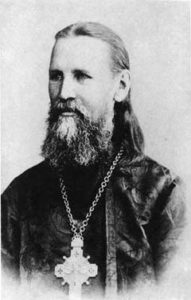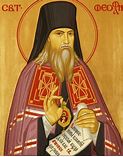SSCORRE!
Saint Sophia Cathedral
Online Resources for our Religious Edification
Topic of the Week – An Incident from the Life of Blessed Xenia of Petersburg
“What do we know of the life and struggles of Blessed Xenia? Xenia Grigorievna was married to a court singer, Andrew Feodorovich Petrov who died quite unexpectedly and suddenly and, evidently, without the rites of the Church.
His death changed, as quickly as lightning, the whole outlook and way of life of Xenia. She understood everything that was great and disdained everything small, unnecessary, temporal….“
Excerpted from “The Glorification of Blessed Xenia” by Metropolitan Philaret of New York
Orthodox Word 14, no 4 (July-August 1978): 148-150 & 199
An Incident from the life of Blessed Xenia of Petersburg
“Here I interrupt my letter in order to quote, word for word, what has been said on this question by Archbishop Andrew of Rockland…
“I am reminded of an incident from the life of Blessed Xenia of Petersburg. She was especially popular among the merchant class. The merchants noticed that every visit by the Blessed one would bring them success in business.
“Once in a certain market place the merchants succeeded in obtaining from a wealthy estate a supply of several sorts of the best honey. There was honey from linden-blossoms, and from buckwheat, and also from other flowers and plants. Each one had its own special taste and fragrance. And when the merchants mixed all three kinds of honey together in one barrel, such a flavor and such taste reproduced as to be beyond one’s wildest dreams. People bought this honey immediately, not sparing any sum of money.
And suddenly Blessed Xenia appeared. ‘Don’t take it, don’t take it,’ she cried; ‘this honey can’t be eaten: it stinks of a corpse.’
‘You’ve gone out of your mind, Matushka! Don’t bother us! You see what profit we are making. And how can you prove that this honey shouldn’t be eaten?’
‘Here’s how I’ll prove it!’ screamed the Blessed one, leaned with all her might on the barrel, and… overturned it.
While the honey was flowing on the sidewalk, people closely surrounded the barrel; but when the honey had flowed out, everyone cried out in horror and revulsion; at the bottom of the barrel lay an immense dead rat. Even those who had bought this honey for a dear price and carried it away in jars, threw it out.
“Why did I recall this incident and quote it?” continued Bishop Andrew. “I will answer willingly… the Orthodox faith is fragrant like good honey. But if you pour this honey into a barrel at the bottom of which there is a dead rat, would you want to taste this honey?‘ He looked at me in horror.
‘Well, of course not.’
‘And so we likewise,’ I replied to him, ‘avoid everything bound up with [that which distorts and contaminates Orthodoxy. These would be]… the same thing as the dead rat at the bottom of the barrel. And if you would fill this barrel to the very top with the very best, most aromatic honey… no, we would not want this honey. The honey itself is superb, but in it has fallen the poison and stench of a corpse.’
“The American nodded his head in silence. He understood [the meaning of the story].
And you?…”
Excerpted from “In Defense of Orthodoxy: Epistle of Metropolitan Philaret to Metropolitan Ireney,” Orthodox Word 11, no. 1 (January-February 1975): 3-5.
A Message from Maria Spanos
I am passionate about our Orthodox Christian faith and seek to help others learn as much as they can about it. My purpose here is to share online resources that help strengthen our relationship with Christ and bind us closer to His Church. I believe they are invaluable in learning about our precious Orthodox Tradition, and are a great aid for teaching family members, friends and others about Orthodoxy. ~Maria
Two of my favorite quotes:
 “A true Christian behaves in this life so that it may be a preparation for the future one and not only a life here below. In his actions, he does not think what will be said of him here but of what will be said there in heaven; he represents to himself that he is always in the presence of God, of the angels and all the saints, and remembers that someday they will bear witness of his thoughts, words, and deeds.” — Saint John of Kronstadt
“A true Christian behaves in this life so that it may be a preparation for the future one and not only a life here below. In his actions, he does not think what will be said of him here but of what will be said there in heaven; he represents to himself that he is always in the presence of God, of the angels and all the saints, and remembers that someday they will bear witness of his thoughts, words, and deeds.” — Saint John of Kronstadt
__________________________________________________________

“Of all the holy works, the education of children is the most holy.”
— St. Theophan the Recluse







